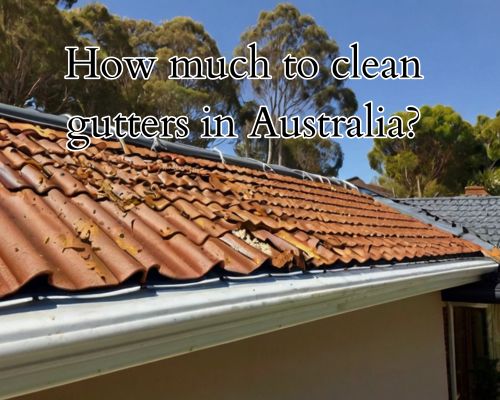How Much to Clean Gutters in Australia? A Melbourne Homeowner’s 2025 Guide
If you’re asking, “How much to clean gutters in Australia?” you’re not alone—especially in tree-lined Melbourne. Gutter cleaning may not be the most glamorous task on your home maintenance checklist, but it’s one that can save thousands in water damage, roof deterioration, and pest infestations.

With Gutter Cleaning Melbourne, we’ll break down the average gutter cleaning costs across Australia, with a sharp focus on what homeowners in Melbourne, Victoria can expect in 2025. You’ll discover the cost factors, benefits of regular cleaning, signs your gutters need attention, and smart ways to save money—all while staying compliant with local safety and property standards.
Average Gutter Cleaning Costs in Australia (2025)
So, how much does it cost to clean gutters in Australia? On average:
- National average cost: $200–$350 per service
- Per linear metre: $4–$10 per metre
- Double-storey surcharge: +$50–$150
- Gutter guard removal (if applicable): $100–$250 extra
These prices can vary depending on your home’s location, height, roof type, gutter condition, and service provider. In Melbourne, due to leafy suburbs like Hawthorn, Camberwell, and Eltham, costs may lean higher due to more frequent debris build-up from eucalyptus, oak, and plane trees.
Melbourne-Specific Gutter Cleaning Costs
In Melbourne, Australia, expect to pay:
- Single-storey home: $150–$250
- Double-storey home: $250–$400
- Large property or commercial building: $400–$800+
- Add-ons like solar panel cleaning, downpipe flush, or gutter guard installation: $100–$300 extra
Companies like Jim’s Mowing, Melbourne Gutter Cleaning, and Grayson’s Gutter Cleaning are established service providers in the area, offering standard and premium packages tailored to Victorian Building Authority (VBA) compliance.
Key Cost Factors to Consider
Several variables affect gutter cleaning prices in Melbourne:
1. Property Height
Higher homes require additional equipment like harnesses or cherry pickers. A second-storey job can cost 40–60% more than ground-level work.
2. Roof Type
Tiled roofs—especially terracotta—are trickier to navigate than Colorbond or metal roofs. Sloped, fragile, or mossy roofs may warrant additional safety precautions.
3. Access Restrictions
Tight driveways, fences, or obstructed areas increase time on site. Some suburbs with heritage zoning like Fitzroy and Carlton can have complex access issues.
4. Debris Level
Heavy leaf build-up, silt, or nesting pests can require more labour and tools like gutter vacuums or pressure washers.
5. Gutter Condition
Rusty, sagging, or broken gutters take longer to clean—and might require repair quotes from roofing specialists.
Why Gutter Cleaning in Melbourne Matters
Melbourne’s four-seasons-in-a-day climate means gutters clog fast. Leaves, dirt, and rain create a perfect storm—literally. Here’s what regular cleaning prevents:
- Water damage to walls, fascia boards, and footings
- Overflow flooding that can affect gardens and internal walls
- Roof deterioration due to pooled water and trapped moisture
- Pest infestations (mosquitoes, rats, birds, possums nesting in blocked gutters)
- Fire hazards, especially in bush-adjacent areas like Doncaster, Ringwood, or Warrandyte during summer months
Keeping your gutters clean ensures you’re also complying with City of Melbourne property maintenance guidelines and potentially staying within the bounds of your home insurance policy.
Signs Your Gutters Need Cleaning
If you’re not sure whether it’s time to call the pros, look for:
- Water overflowing during rainstorms
- Plants or moss growing from your gutters
- Gutter sagging or pulling away from the fascia
- Visible staining on walls or ceilings inside your home
- A spike in pest activity near your roofline
Many local services offer drone inspections or before-and-after photos, so you’re not guessing in the dark. For professional needs, just go to Gutter Cleaning Melbourne.
How Often Should Melbourne Homes Have Gutters Cleaned?
A general rule of thumb:
- Twice a year: Spring and Autumn
- Quarterly for homes near heavy tree cover (e.g., Kew, Balwyn, or Mount Dandenong)
- Monthly in high-risk fire zones or with installed solar panels
Many Melbourne gutter cleaning services offer seasonal maintenance plans, with discounts for bundling in solar panel cleaning, window washing, or minor roof repairs.
DIY vs Professional Gutter Cleaning
Thinking of doing it yourself? Let’s weigh the pros and cons.
DIY Pros:
- Immediate cost savings
- Control over cleaning quality
- Opportunity to inspect your roof condition
DIY Cons:
- Safety risk (working at heights without proper gear)
- Time-consuming and physically demanding
- Potential for property damage
- May void your insurance policy if accidents occur
Professionals are insured, equipped with fall-arrest systems, and trained in WorkSafe Victoria protocols. For many Melbourne homeowners, the convenience and reduced liability far outweigh the upfront cost.
Smart Tips to Save on Gutter Cleaning in Melbourne
- Bundle services (cleaning + gutter guard install)
- Ask about seasonal promos (e.g., end-of-winter specials)
- Book in off-peak seasons (early spring or late autumn)
- Get a quote from at least 3 local providers
- Consider gutter guard systems to reduce cleaning frequency
Some reputable Melbourne companies also offer subscription-style maintenance, lowering your annual gutter cleaning cost by 10–30%.
Final Thoughts: Is Gutter Cleaning Worth the Cost?
Absolutely. Compared to the $10,000+ repair bill from water damage or a collapsed roofline, the average $250 gutter clean in Melbourne is a drop in the bucket—literally. Whether you’re in Brighton, Brunswick, or Berwick, a clean gutter keeps your home healthy, your drainage flowing, and your headaches minimal.
So, next time you catch yourself Googling, “How much to clean gutters in Australia?”, remember: Melbourne homeowners can expect to pay around $150–$400, depending on your home’s specifics, and it’s a small price for long-term protection.
📍 Local Gutter Cleaning Providers in Melbourne (2025 Snapshot)
| Company Name | Service Area | Price Range | Notable Services |
|---|---|---|---|
| Jim’s Mowing Gutter Cleaning | Greater Melbourne | $180–$400 | Eco-friendly options, solar panel add-ons |
| Grayson’s Gutter Cleaning | Inner-East Suburbs | $150–$350 | Heritage home expertise |
| Gutter-Vac Melbourne | Metro + Bayside | $200–$450 | Vacuum system, downpipe flushing |
| MyHome Gutter Cleaning | South-Eastern Suburbs | $170–$300 | Subscription discounts |
TL;DR: Your Gutter Cleaning Cost Summary (Melbourne 2025)
- 💰 Cost: $150–$400 (residential average)
- 📍 Location Influence: High tree cover = higher cost
- 🧹 Frequency: 2–4x/year for optimal performance
- 🛠️ DIY?: Risky, better left to pros
- 📞 Book ahead in spring/autumn for best rates




